Daughter of a former Deputy Senate President, Ike Ekweremadu, has revealed that she suffers from a kidney condition called nephrotic syndrome.
She said her physicians discovered in August 2021 that she might need a kidney transplant and that, that was when the search for an organ donor started.
She said that she had two alternatives: to be on kidney dialysis for the rest of her life or get an organ transplant.
She added that no member of her family, especially those directly related to her dad, qualified to donate a kidney because “they have quite a history of kidney condition among them.”
Nephrotic syndrome is a kidney disorder that causes the victim’s body to pass too much protein in the urine.
Experts at Mayo Clinic say the condition is usually caused by damage to the clusters of small blood vessels in the kidneys that filter waste and excess water from the blood.
The condition causes swelling, particularly in the feet and ankles, and increases the risk of other health problems.
Doctors warn that nephrotic syndrome can increase the patient’s risk of infections and blood clots.
Signs and symptoms of nephrotic syndrome include:
- Severe swelling (edema), particularly around the eyes, ankles and feet
- Foamy urine, a result of excess protein in urine
- Weight gain due to fluid retention
- Fatigue
- Loss of appetite
Sonia disclosed her condition on Friday in an interview with the BBC following her parents’ sentencing to a combined prison terms of 14 years and four months.
She expressed sadness and guilt over the sentencing following the Ekweremadus’ conviction for organ trafficking.
A United Kingdom court on Friday sentenced Ike Ekweremadu to a total of nine years and eight-month imprisonment; while his wife, Beatrice, received four and a half years’ jail term for organ trafficking.
The third accomplice, a medical doctor, Obinna Obeta, was jailed 10 years.
Ekweremadu, 60, and his wife Beatrice, 56, had attempted to procure a new kidney for their 25-year-old daughter Sonia, who is currently on dialysis for a life-threatening kidney disease called nephrotic syndrome.
In the BBC interview, Sonia said she felt guilty about the whole situation.
“I don’t think it will ever be the same again. And obviously, I feel guilty because I feel like all these have happened because of me,” she said, while holding back tears.
On how her parents have handled their current reality, the 25-year-old who admitted that she can’t speak about what they truly feel, said they are “quite calm”.
“They are quite calm, surprisingly. But I can’t really speak about what they are feeling. This is just from an outside perspective of me seeing them. They are okay, they are just neutral,” Sonia said.
On what she has learnt over the whole saga, Sonia said, “Life is just some dynamic. Like you’re one day in your house chilling and the next day your whole life is turned around, upside down.”
Speaking further on the court judgement, she added, “It’s sad. It’s been really hard to wrap my head around it. I understand the conviction. Personally, I disagree with it; however, that’s from a very biased perspective as their daughter, and I would obviously back my parents.
“However, the law has taken its course, and we just have to now move forward as a family.”
Asked about what she would be doing next, Sonia said, “My main focus is to try to help, specifically people with kidney conditions. This is just to show them they don’t need to be scared.
“I will continue to support my parents and siblings as well.”


